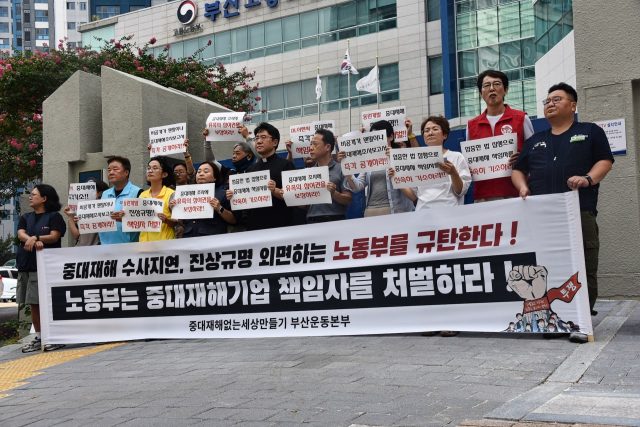|
{preheader}
|
Letter from the Editor
On September 27, Climate Justice marches took place across South Korea.
The climate crisis grows more severe daily, with people collapsing and countless lives lost in workplaces and communities amid climate disasters.
Many workers, in particular, are dying or suffering health damage from extreme heat and scorching temperatures. We demand workers’ right to stop work in the face of this reality. We declared that capitalism, which runs 24 hours nonstop, must prioritize workers’ health and lives over profit.
We hold the Climate Justice March every year, believing it is time for us to act for climate justice.
We hope everyone will take an interest and participate in this struggle to end the climate crisis and inequality, aiming for a world where all life can live with dignity.
We hope that you will continue to be interested in our activities. Please pass it on to others.
If you have any questions, please reply to this email.
Thank you.
|
|
| |
In-depth review
3 years since the Serious Accidents Punishment Act; What has changed? (Jun.2025)
|

|
| |
|
The “Act on the Punishment of Serious Accidents” (hereinafter referred to as the “Serious Accidents Punishment Act”) was introduced multiple times during the 19th and 20th National Assembly sessions, but it was repeatedly discarded without even being deliberated, as each session ended. On April 30, 2020, a devastating fire at the Icheon Logistics Center claimed the lives of 38 workers. In response, 136 civic organizations united on May 17 to launch the People’s Campaign for the Enactment of the Serious Accidents Corporate Punishment Act. In order to change the grim reality where six to seven workers were dying at work every single day, they collected over 100,000 signatures through a national petition and held sit-ins in front of the National Assembly despite the freezing cold. Bereaved families of industrial accident victims undertook a hunger strike lasting more than a month. It was only after these collective efforts that the Act was finally passed — on January 8, 2021.
The Serious Accidents Punishment Act, enacted through this process, came into effect on January 27, 2022. As of January 27, 2024, its scope was expanded to include workplaces with five or more employees. Now in its fourth year of enforcement, this article reflects on whether the Act is being implemented in line with its original intent and examines the challenges that lie ahead.
|
| |
| |
KILSH’s studies
Why workers cannot rest, even when sick (2024)
|
| |
|
This study investigates why precarious workers in South Korea are unable to take adequate sick leave despite illness or injury and proposes policy solutions to close this gap. The COVID-19 pandemic popularized the idea that “staying home when sick” is directly linked not only to individual health but also to the safety of society as a whole. However, South Korea remains the only OECD country with neither statutory paid sick leave nor a sickness benefit scheme. Even the government’s 2022 pilot sickness-benefit program fails to meet the needs of precarious workers. This study highlights how workers who already struggle to access workers’ compensation for occupational injuries are even less able to rest for non-work-related illnesses, and it calls for the institutional redesign of sickness benefits, introduction of paid sick leave, and universal coverage of workers’ compensation.
|
| |
| |
About KILSH(Korea Institute of Labor Safety and Health)
|
| |
|
KILSH is a public interest civil society group focusing on workers’ health and safety. We are working for healthy working conditions for all workers, and for workers to have greater autonomy in their workplaces. We meet and educate workers and trade unions on how to prevent occupational injuries and describe how to get involved in changing the working environment.
We have worked on important issues such as musculoskeletal disorders, long working hours, overwork and mental illness. We have continued our work on workers’ health rights at small-sized businesses, female workers’ health, the climate crisis, the right to stop dangerous work and how risk assessment is conducted and used. These issues are described in our monthly magazine on occupational safety and health with different topics every month. Our translation team provides information about our activities in English.
|
| |
|